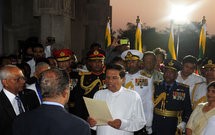 Incumbent Sri Lankan President Mahinda Rajapaksa conceded defeat in the nation's Jan. 8 presidential election. His opponent in the polls was former Health Minister Maithripala Sirisena, who was sworn in as president on Jan. 9. This transition marks the end of a decade of strong, centralized rule under former president Rajapaksa, who previously won a decisive 2009 victory over the Liberation Tigers of Tamil Eelam, known as the Tamil Tigers. The most recent election was widely viewed as a referendum on Rajapaksa's controversial leadership style. Public sentiment is highly polarized on this topic and Sirisena, who served in Rajapaksa's administration, won by a narrow margin, with 51.3 percent of the vote.
Incumbent Sri Lankan President Mahinda Rajapaksa conceded defeat in the nation's Jan. 8 presidential election. His opponent in the polls was former Health Minister Maithripala Sirisena, who was sworn in as president on Jan. 9. This transition marks the end of a decade of strong, centralized rule under former president Rajapaksa, who previously won a decisive 2009 victory over the Liberation Tigers of Tamil Eelam, known as the Tamil Tigers. The most recent election was widely viewed as a referendum on Rajapaksa's controversial leadership style. Public sentiment is highly polarized on this topic and Sirisena, who served in Rajapaksa's administration, won by a narrow margin, with 51.3 percent of the vote.
Voter turnout was high nationwide, some estimates placing attendance at more than 70 percent. Participation was particularly high in ethnic Tamil enclaves in the island's north and northeast, where public support largely favored Sirisena. Ethnic Muslim voters, the country's second largest minority, also strongly supported Sirisena, especially in the wake of rising anti-Muslim violence perpetrated by Sinhalese Buddhist hardliners. Buddhist nationalists were a core part of outgoing President Rajapaksa's political base.
Sirisena will face difficulties in shaping the government, where the Rajapaksa administration retains strong political and military loyalties. This will be compounded by Sirisena's stated objective of doing away with the executive presidency in favor of a parliamentary system, which would require him to draft and pass a new constitution. He also issued a campaign to hold parliamentary elections within the next 100 days.
The months ahead could prove tumultuous for Sri Lanka following the exit of one of its most decisive post-independence leaders. The new president's backers represent a broad range of ethnic, religious and political interests — Tamil Hindus, Muslims, Marxists and Sinhalese Buddhists. At the same time, Sirisena has long been a part of the hardline Sinhalese Rajapaksa political machine. He has vowed to maintain a strong military presence in Tamil regions of the island and to uphold the prerogatives of the majority Sinhalese population. This will prove difficult with Tamil interests calling for a drawdown of troops.
Nearby India will also seek to slowly improve relations with Colombo following Sirisena's victory, with an eye toward countering an increasing Chinese influence.Under the Rajapaksa administration, China surpassed Japan as Sri Lanka's primary donor, contributing $4 billion in assistance between 2005 and 2012 and committing a further $2 billion since then — mostly in high-interest loans.
Sirisena's chosen prime minister, United National Party head Ranil Wickramasinghe, who was also sworn in Jan. 9, said he would scrap a $1.34 billion China-backed port city project in Colombo, which was inaugurated by Chinese President Xi Jinping in September. Such a move could potentially encourage New Delhi but aggravate Beijing. People's Liberation Army Navy ships twice docked in Sri Lankan ports in 2014, much to the consternation of an Indian government that suffered rocky relations with Rajapaksa for much of his 10 years in office.
India's Ambassador to Sri Lanka, Yash Sinha, was the first foreign envoy to call on the newly-elected Sirisena to congratulate him.
Courtesy : Stratfor (www.stratfor.com)